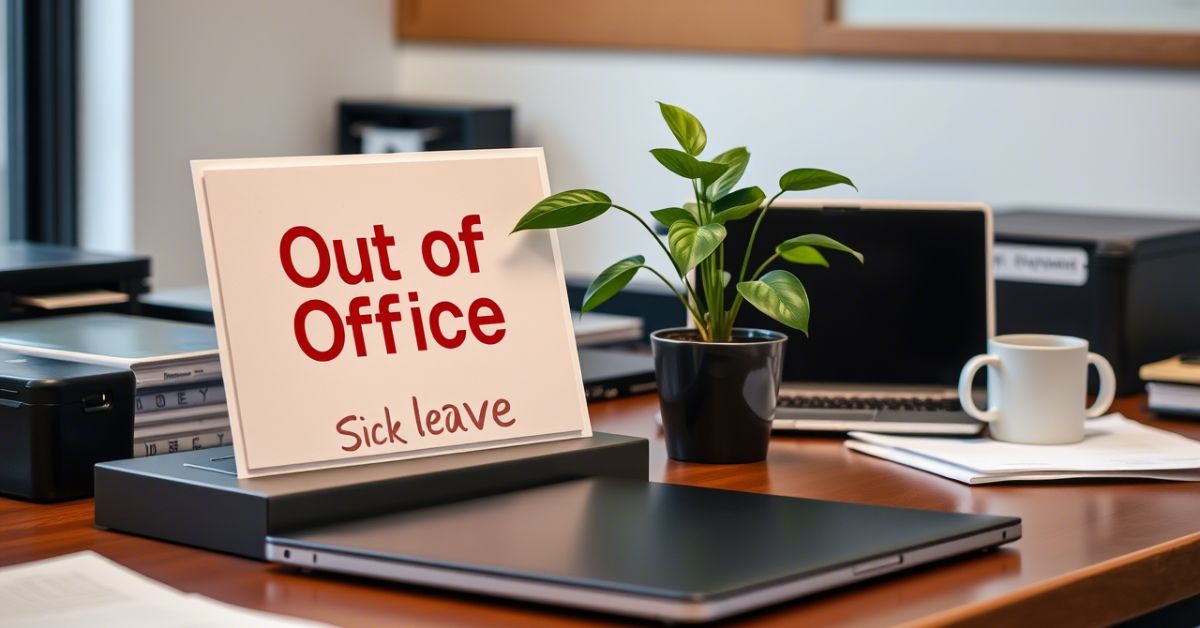Out of office messages are essential tools to inform others when you’re unavailable. Whether you’re on vacation, sick leave, or just stepping away from your desk, these messages let colleagues, clients, or customers know that you can’t respond right away. Crafting the perfect out of office message helps manage expectations and ensures communication continues smoothly even when you’re not around. It’s crucial to include the right information, such as your return date, alternate contact, or urgent assistance instructions.
A well-written out of office message can save time and reduce misunderstandings. By customizing your message for the situation, you show professionalism and consideration. These messages are not just for emails; they can also be set on phones and other platforms. 30+ Out of Office Messages for Sick Leave are a simple yet effective way to maintain smooth communication while you’re away, whether it’s for sick leave or a planned break. Always make sure to update your message to reflect your current status.
Short Out-of-Office Messages for Sick Leave
- “I’m out of the office due to illness and will be back on [date]. For urgent matters, please reach out to [colleague’s name] at [email].”
- “I’m currently out sick and will not be checking emails until I return on [date]. If you need immediate assistance, please contact [colleague’s name].”
- “I’m out of the office for health reasons and will return on [date]. If your matter is urgent, please reach out to [colleague’s name].”
- “Thank you for your message! I am currently sick and away from the office. I will respond to your email as soon as I return on [date].”
- “I am out sick today and may have limited access to email. I plan to return by [date], but if you need immediate help, please contact [colleague’s name].”
Detailed Out-of-Office Messages for Medical Leave
Out of office messages for medical leave should convey your absence clearly while offering an alternative contact for urgent matters. It’s important to be polite, concise, and professional, setting expectations for your return. These messages reassure your contacts that you are unavailable but help guide them to the appropriate resources.
Examples:
- “I am currently on medical leave and will return to the office on [date]. During my absence, please contact [colleague’s name] at [email/phone] for immediate assistance.”
- “Thank you for reaching out. I am out on medical leave and will be unavailable until [date]. For urgent inquiries, please reach out to [colleague’s name] at [email/phone].”
- “I’m out of the office due to medical reasons and will be back on [date]. If your request is urgent, please contact [colleague’s name] at [email/phone] for help.”
Out-of-Office Messages for Sick Leave with No Return Date
Out-of-office messages for sick leave without a return date should clearly communicate your unavailability while managing expectations. Since the return date is uncertain, it’s important to inform contacts that you’ll respond when you’re able and offer an alternative contact for urgent matters. This ensures a smooth workflow in your absence.
Examples:
- “I’m currently out of the office due to illness and don’t have a confirmed return date. For urgent matters, please reach out to [colleague’s name] at [email/phone].”
- “I am out sick and unable to respond to emails at this time. I do not have a return date yet, but please contact [colleague’s name] for immediate assistance.”
- “Due to illness, I am away from the office indefinitely. If you need immediate support, please contact [colleague’s name] at [email/phone]. I will respond as soon as possible.”
Creative Out-of-Office Messages for Sick Leave

Creative out-of-office messages for sick leave can add a personal touch while keeping things professional. Here are a few fun yet respectful messages that convey your unavailability with some personality:
Examples:
- “I’ve been hit with an unexpected illness and am currently taking some sick time to recover. I’ll be back as soon as I’m feeling better! In the meantime, please contact [colleague’s name] for urgent needs.”
- “I’m out of the office, battling a nasty cold (the flu’s not invited!). I’ll be away until I’m back on my feet. For immediate help, please reach out to [colleague’s name] at [email/phone].”
- “Sick day! I’m currently away from the office trying to get better. I’ll be responding to emails as soon as I’m back, but if you need immediate assistance, please contact [colleague’s name]. Thanks for your understanding!”
- “I’m out of the office due to illness, but I’ll be back soon, ready to tackle things! For urgent matters, please reach out to [colleague’s name]. I appreciate your patience.”
Out-of-Office Message for Sudden Sick Leave
When you need to take sudden sick leave, an out-of-office message should be brief, polite, and informative. You can acknowledge your absence, explain that it’s unexpected, and provide alternative contact details for urgent matters. This ensures your colleagues and clients can still get assistance while you’re away.
Examples:
- “I’m currently out of the office due to an unexpected illness and unable to respond to emails. I will be back as soon as possible. For immediate assistance, please contact [colleague’s name] at [email/phone].”
- “Unfortunately, I’m out sick today and don’t have access to email. If you need urgent support, please reach out to [colleague’s name] at [email/phone]. Thank you for your understanding!”
- “Due to an unforeseen illness, I am away from the office. I’m unable to respond at the moment but will get back to you as soon as I can. For urgent matters, please contact [colleague’s name].”
Contacting Colleagues During Sick Leave
When on sick leave, maintaining communication with your colleagues is essential to ensure work continuity. Even if you’re unable to respond immediately, it’s important to let your team know who to contact in your absence. Delegate any ongoing tasks or projects and provide clear instructions to avoid delays. This shows your commitment to the team’s success, even when you can’t be present.
If your illness makes it difficult to handle communication, you can arrange for a colleague to act as a point of contact for any urgent issues. Ensuring someone is available to cover your responsibilities minimizes disruption and demonstrates professionalism. Keeping communication lines open helps maintain workflow, even while you focus on recovery.
How to Address Sick Leave in a Team Environment

In a team environment, it’s important to address sick leave transparently to keep everyone on the same page. As soon as possible, inform your manager and teammates about your situation and provide an estimated timeline for your return, if known. This allows others to adjust workloads and plan accordingly. Clear communication helps avoid confusion and ensures the team can continue moving forward.
It’s also essential to be understanding and cooperative. Encourage your colleagues to reach out if they need assistance during your absence, while also respecting your time to rest. By offering clear guidance on what’s expected and whom to contact, you ensure that both your team’s needs and your personal recovery are balanced.
Read This Blog: Top 20+ Funny Daughter Quotes from Mom
Out-of-Office Messages and Company Policies
Out of office messages are key to setting expectations when you’re on sick leave. Many companies have specific guidelines for informing coworkers and customers about your absence, and it’s important to follow them. These guidelines might include setting up automated email responses or notifying HR. Following company protocols keeps your absence well-managed and ensures you’re in compliance with workplace policies.
Each company may have different sick leave policies regarding duration and documentation. In some cases, you might be required to provide a doctor’s note or inform your team within a certain time frame. Adhering to these policies not only keeps everything running smoothly but also ensures that your sick leave is properly documented and recognized.
FAQ’s
How do I write an out of office message for sick leave?
When writing a message for sick leave, be clear and concise. Mention your absence and provide an alternative contact for urgent matters in your “Out of Office Messages.”
How do I inform sick leave on messages?
Informing about sick leave should include the dates of your absence. Be polite and let others know when you can be reached, using out of office messages for clarity.
How do you say “sick leave” in the office?
In the office, you can mention you’re taking sick leave by simply stating you’re out due to illness. Out of office messages should follow for clarity.
What is the best message for sick leave?
The best message for sick leave should be polite and professional, stating your unavailability. Out of office messages should include alternative contacts for urgent needs.
How do I say I am sick professionally?
To say you’re sick professionally, state that you’re unwell and unable to respond. Out of office messages can politely guide colleagues to alternative contacts while you’re away.
Conclusion
Out of Office Messages are an important way to keep others informed when you’re unavailable. These messages help set expectations and ensure smooth communication while you’re away. Whether you’re on vacation, sick leave, or out for any other reason, an out of office message helps others know when to expect a response. It’s a simple yet effective tool to ensure that your absence doesn’t disrupt workflows.
When crafting Out of Office Messages, it’s important to provide clear details, like your return date or an alternative contact person for urgent matters. This allows people to know how to proceed while you’re away. Out of Office Messages are easy to set up and customizable for different situations. By using them, you maintain professionalism and make sure that everything continues smoothly in your absence, no matter the reason for being out.

“Captions Vanity is your ultimate hub for the latest and trendiest captions. From Instagram-worthy lines to catchy phrases, we’ve got you covered for every mood and moment. Discover fresh, creative, and unique captions that make your posts shine. Stay inspired, express yourself, and let your captions do the talking.”

